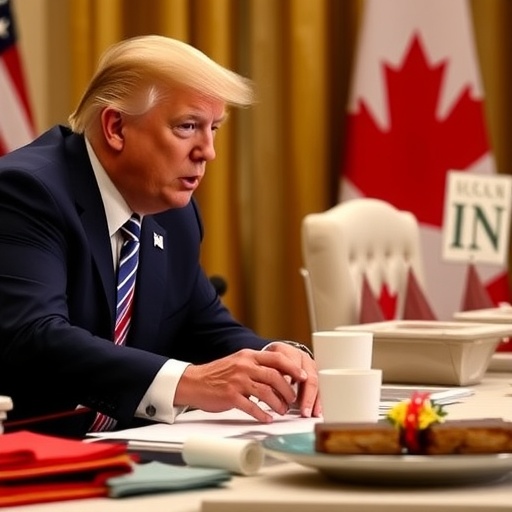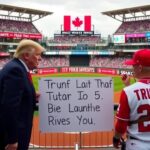Trump Halts US-Canada Trade Talks After Provocative World Series Ad: Escalating Tensions Ahead of ASEAN Summit
In a stunning escalation of bilateral frictions, President Donald Trump announced on Tuesday that the United States is immediately suspending trade talks with Canada, citing a controversial advertisement aired during Game 1 of the World Series that lambasted his tariff policies. The 30-second spot, produced by the Ontario provincial government, depicted American tariffs as a “baseball bat to the gut of Canadian workers,” drawing millions of viewers and igniting a firestorm of diplomatic backlash. This move comes just weeks before the ASEAN summit, where global trade dynamics could be profoundly influenced by the unraveling US-Canada relationship.
- Ontario’s World Series Ad: A Calculated Jab at US Tariffs
- Trump’s Immediate Halt: Inside the White House Trade Strategy Shift
- US-Canada Trade Tensions: From USMCA to World Series Fallout
- Economic Ripples: Jobs, Industries, and Consumer Prices at Risk
- ASEAN Summit Shadows: Global Trade Ramifications Unfold
The World Series, pitting the Los Angeles Dodgers against the New York Yankees in a high-stakes showdown, provided an unexpected platform for international politics. Broadcast on Fox Sports, the ad reached an estimated 12.5 million viewers in the US alone, according to Nielsen ratings. Trump‘s response was swift and unyielding, posted via his Truth Social platform: “Canada thinks they can mock American strength during our national pastime? No more trade deals until they apologize and retract this nonsense. Tariffs are protecting our jobs—time Canada learns that!” This declaration marks a sharp pivot in ongoing negotiations aimed at refining aspects of the USMCA trade agreement, which replaced NAFTA in 2020.
Trade between the US and Canada is a cornerstone of North American economics, with bilateral goods and services trade totaling $1.2 trillion in 2023, per US Census Bureau data. Key sectors like automotive manufacturing, energy exports, and agriculture stand to suffer from any prolonged standoff. Ontario, home to major auto plants supplying Detroit, is particularly vulnerable, as the ad’s creators intended to highlight. The province’s Premier, Doug Ford, defended the spot in a press conference, stating, “We’re not backing down. These tariffs are hurting families on both sides of the border—it’s time for honest talk, even if it airs during the bottom of the ninth.”
Ontario’s World Series Ad: A Calculated Jab at US Tariffs
The advertisement in question, titled “Tariffs: Out of the Park?” by Ontario’s economic development ministry, was no accident of timing. Aired during the seventh-inning stretch of Game 1 on October 25, it featured dramatic footage of Canadian lumberjacks and factory workers interspersed with clips of baseball players striking out. Narrated by a gravelly voice reminiscent of classic sports announcers, the script read: “President Trump’s tariffs are swinging wild—striking out jobs in Ontario and beyond. Is this a home run for America, or a foul ball for fair trade?” The spot ended with a call to action: “Tell Washington: Play fair.”
Costing an estimated $2.5 million to produce and air, the ad was part of a broader $10 million provincial campaign launched in September to counter what Ontario officials describe as “unfair US protectionism.” Since Trump’s re-election in 2024, his administration has imposed or threatened tariffs on Canadian steel, aluminum, and softwood lumber, echoing disputes from his first term. In 2018, similar levies led to retaliatory Canadian tariffs on US whiskey, yogurt, and ketchup, costing American exporters over $1 billion, according to the US Chamber of Commerce.
Reactions to the ad were polarized. US baseball fans on social media platforms like X (formerly Twitter) flooded with memes mocking the “foreign interference,” while Canadian viewers praised its boldness. MLB Commissioner Rob Manfred issued a neutral statement: “We value all advertisers who support the game, but political content is always a sensitive area.” The ad’s virality exploded post-airing, garnering over 5 million YouTube views within 24 hours and trending under hashtags like #WorldSeriesTariffs and #CanadaStrikesBack.
Experts in international advertising note the strategic genius. Dr. Elena Vasquez, a media studies professor at the University of Toronto, explained in an interview, “By hijacking the World Series—a quintessentially American event—Ontario turned a local grievance into a global spectacle. It’s guerrilla marketing meets diplomacy, forcing Trump to respond on a stage he can’t ignore.” This tactic echoes past uses of sports for political messaging, such as the 1980 Moscow Olympics boycott amid Cold War tensions.
Trump’s Immediate Halt: Inside the White House Trade Strategy Shift
President Trump’s decision to halt trade talks was not made in isolation. Sources close to the negotiations, speaking anonymously to Reuters, reveal that talks had been progressing on updates to USMCA rules of origin for electric vehicles and critical minerals—vital for the green energy transition. The US imported $78 billion in Canadian goods in the first half of 2025 alone, including 20% of its oil needs from Alberta’s oil sands.
In a Rose Garden press briefing, White House Trade Representative Katherine Tai elaborated on the suspension: “This ad wasn’t just an opinion; it was a deliberate provocation undermining our sovereign trade policies. Until Canada demonstrates respect, we pause all discussions.” Trump’s post drew 2.3 million interactions within hours, amplifying his narrative of America First. Critics, including Senate Minority Leader Chuck Schumer, called it “petty theater,” warning, “Halting talks over a TV spot risks jobs in Michigan and New York—states that voted for fair trade.”
The timing is particularly fraught. With midterms looming in 2026, Trump is leveraging the issue to rally his base in Rust Belt states, where manufacturing employs 12 million workers. A 2024 Pew Research poll showed 62% of Americans view Canada favorably, but support for tariffs rises to 55% among Republicans when framed as job protection. Economists like those at the Peterson Institute for International Economics estimate that a full trade war could shave 0.5% off US GDP, with Canada facing a steeper 1.2% hit due to its export dependency—85% of Canadian goods go south.
Behind the scenes, Trump’s team has history with such escalations. During his first term, a 2018 G7 summit spat with Canadian Prime Minister Justin Trudeau led to delayed tariff relief. Now, with Trudeau’s Liberals facing domestic pressures, the ad’s airing may have been a bid for nationalist support in Ontario, a swing province.
US-Canada Trade Tensions: From USMCA to World Series Fallout
The roots of this dispute trace back to the USMCA’s implementation in 2020, which Trump hailed as a victory but has since criticized for loopholes. Recent flashpoints include US tariffs on Canadian dairy (up to 270% on certain cheeses) and disputes over digital services taxes that Canada imposed on tech giants like Google and Meta—many US-based. In retaliation, the US threatened 25% tariffs on Canadian autos, a sector worth $100 billion annually.
Statistics underscore the stakes. The US-Canada border sees $2.6 billion in daily trade, more than US-Mexico and US-China combined. Ontario alone exports $150 billion to the US yearly, supporting 1.5 million jobs. A halted talks scenario could delay investments in battery plants for EVs, where Canada supplies 40% of North America’s lithium and cobalt precursors.
Canadian Foreign Minister Mélanie Joly responded measuredly: “We regret any misunderstanding, but our ad reflects real concerns. Trade talks benefit both nations—let’s resume dialogue.” Yet, whispers in Ottawa suggest internal divisions, with Ford’s Progressive Conservatives pushing a harder line against federal Liberals. A recent Angus Reid poll indicates 68% of Canadians oppose conceding to US demands, up from 52% pre-ad.
Broader context includes global supply chains. The World Series ad arrives amid US efforts to “friend-shore” critical minerals away from China, relying on Canadian deposits in Quebec and Nunavut. Disruptions here could hinder Biden-era—no, wait, Trump’s—green initiatives, ironically aligning with his tariff rationale of securing domestic supply.
- Key Trade Stats: US exports to Canada: $350 billion (2024); Canadian retaliation potential: $16 billion in targeted goods.
- Historical Precedent: 2002 softwood lumber dispute cost $5 billion in lost trade.
- Current Flashpoints: Steel tariffs (10-25%), EV incentives under USMCA Chapter 4.
Analysts from the Brookings Institution warn that politicizing trade via pop culture risks long-term damage. “Turning the World Series into a tariff tribunal erodes trust,” said senior fellow David Dollar. “Both sides need de-escalation to avoid a North American chill.”
Economic Ripples: Jobs, Industries, and Consumer Prices at Risk
The suspension’s immediate economic fallout is already evident. On Wall Street, shares of Ford and General Motors—reliant on cross-border parts—dipped 3% and 2.5% respectively post-announcement. In Canada, the loonie fell 1.2% against the dollar, hitting a five-month low. Energy markets jittered as WTI crude futures rose on fears of restricted pipeline flows from Canada’s Enbridge Line 5.
For American consumers, higher tariffs could inflate prices: a 10% levy on Canadian lumber might add $1,000 to the cost of a new home, per the National Association of Home Builders. Agriculture faces blowback too—US farmers exported $25 billion in grains to Canada last year; retaliation could mirror 2018’s maple syrup bans, though symbolic, hitting symbolic exports.
In Ontario, auto unions rallied outside Queen’s Park, with Unifor president Lana Payne stating, “This ad was a wake-up call. Trump’s halt threatens 50,000 jobs in Windsor alone.” Broader impacts include supply chain snarls: 70% of Canadian vehicles are US-bound, and delays could idle Detroit lines, echoing COVID-era shortages that cost $210 billion globally.
Small businesses feel the pinch acutely. A Buffalo, NY, importer of Canadian cheeses reported to CNBC, “We’re bracing for 20% price hikes—our customers won’t pay that.” On the flip side, US steelmakers like Nucor praised the move, with CEO Leon Topalian noting, “Protection from subsidized imports is crucial; this signals resolve.”
Longer-term, the IMF projects a 0.3% drag on regional growth if talks stall through 2026. Sectors like aerospace (Bombardier supplies Boeing) and renewables (Canadian wind turbine components) hang in balance, potentially redirecting investments to Mexico under USMCA alternatives.
ASEAN Summit Shadows: Global Trade Ramifications Unfold
As the ASEAN summit approaches in November 2025 in Jakarta, the US-Canada rift casts a long shadow. Leaders from the 10-nation bloc, plus dialogue partners like the US and China, will discuss supply chain resilience amid US protectionism. Trump’s absence from preliminary talks—due to the halt—signals a frosty North American stance, potentially emboldening China’s Belt and Road overtures to Canada.
Canada, an ASEAN dialogue partner since 1977, exports $5 billion in goods to the region annually, including seafood and aircraft parts. A weakened US alliance could push Ottawa toward deeper Asia-Pacific ties, as seen in its CPTPP membership. US officials, per leaked memos, worry this erodes leverage against Chinese dominance in EVs and semiconductors.
Forward-looking, reconciliation paths include backchannel diplomacy via the G20 or WTO. Canadian Ambassador to the US, Kirsten Hillman, hinted at “quiet overtures” for a reset. Trump, however, doubled down in a Fox News interview: “They want talks? Apologize first. We’re winning the trade game.”
Implications extend to allies: Mexico, USMCA’s third leg, urged unity in a statement from President Claudia Sheinbaum, warning of “contagious instability.” For global markets, a prolonged spat risks inflating commodity prices—Canadian potash affects 20% of world fertilizer supply, critical for food security.
Stakeholders eye November’s summit as a pivot. If Trump attends, side meetings could thaw ice; otherwise, escalated tariffs loom, reshaping North American trade for years. As one trade lawyer at WilmerHale put it, “From baseball diamonds to diplomatic minefields—this ad hit a grand slam of unintended consequences.” The world watches as two neighbors, bound by geography and history, navigate this unexpected curveball.







